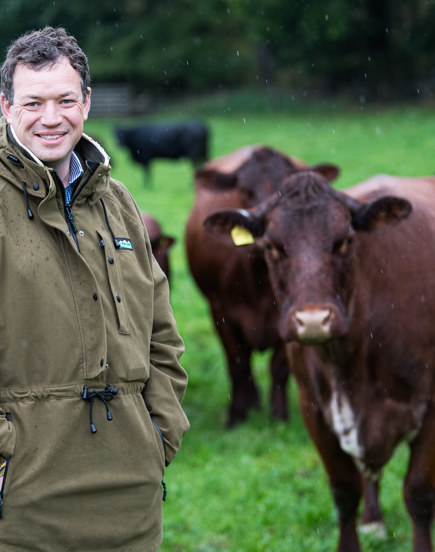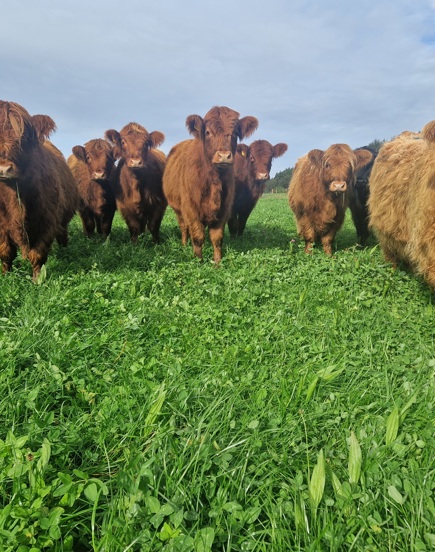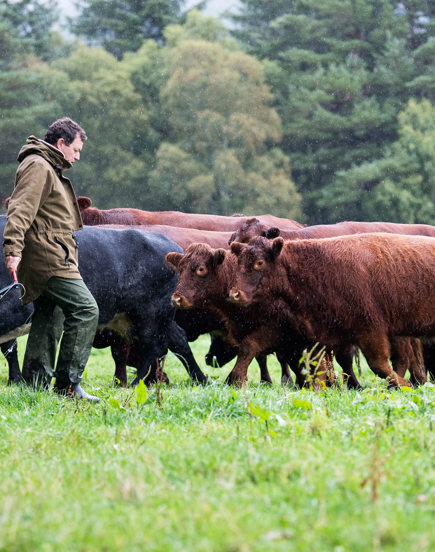Edinvale Farm
Edinvale Farm is a family-run upland enterprise in Moray, producing high-quality beef from native breeds such as Highland and Shorthorn cattle, with some Aberdeen Angus crosses.
All animals are grass and forage fed, and much of the produce is sold through the family’s Macbeth’s Butchers in Forres, which supplies households, hotels, and restaurants across Scotland.
Scottish Food & Drink September
When Jock Gibson took over Edinvale from his parents in 2015, he knew the business had to change. Today, alongside his wife Fiona, he’s blending traditional methods with new practices to reduce emissions and build resilience, shaping the farm to meet modern environmental and consumer demands.
For the Gibsons, innovation isn’t about chasing fads but about rethinking the fundamentals: how grass is managed, how cattle are reared, and how consumers are engaged.
When Jock took over, the farm wasn’t financially sustainable under the existing model and buying more land or cattle wasn’t an option. Instead, he asked a different question: how could the farm get more out of what it already had? The answer came in 2018 with rotational grazing. By dividing land into paddocks and carefully managing how long animals graze and how long pastures rest, Jock shifted the focus from maximum short-term output to long-term resilience.
“We started rotational grazing as a necessity, not a trend,” he explains. “It was about making better use of the land we had. Over time, it’s become clear that resilience was the real prize: healthier grass, healthier cattle, and a system that copes better with extremes like drought and heavy rain.”
By leaving taller grass covers and allowing for longer recovery periods, Edinvale’s pastures now bounce back more effectively after such weather extremes. The result has been fewer bare patches, better soil cover, and more consistent forage for livestock throughout the year – an important development when faced with ongoing climate volatility.

One of the boldest steps came in 2021, when the farm stopped using nitrogen fertiliser. For many, this would seem risky, but Jock says the results have been pleasantly surprising.
“Grass growth hasn’t fallen off a cliff. Yes, silage yields have dipped, especially on the second cut, but overall, we’re not seeing significantly less grass. Soil health and organic matter are carrying us.”
This reflects a wider principle of moving to less intensive farming: short-term dips can precede a recovery as soils rebuild organic matter, microbial activity, and natural nutrient cycles. Productivity may fall initially, but resilience grows.
The implications extend far beyond Edinvale. Synthetic fertiliser is one of the food and drink sector’s largest emissions sources. By cutting it out entirely, the farm is demonstrating how upland Scottish farms can significantly reduce their carbon footprint while maintaining viable production.
Edinvale’s net zero commitment is underpinned by evidence. The farm has been carbon audited every year and contributes to industry baselining projects. But Jock is clear that metrics are a guide, not the driver.
“Our first question is always: is this good for the cattle, and is it good for the grass? If those two are right, the emissions picture usually follows.”
That pragmatic approach extends beyond the fields. Through Macbeth’s Butchers in Forres, Edinvale maintains a direct line to consumers. This interaction shapes how the farm produces and markets its beef. Consumers increasingly ask about “organic,” “grass-fed,” or “sustainable” meat, and Jock sees it as his job to listen as much as to educate.
“People are often confused about red meat. They’ve heard it’s bad for the planet or bad for health. What we try to offer is a guilt-free eating experience: high welfare, no fertiliser, no additives, and beef that tastes as it should. Less, but better.”

This consumer-first model is a reminder that Scotland’s net zero ambitions in food and drink must connect with market demand as much as farm practice.
For Jock, innovation is not about overnight transformation but about steady, bite-sized change. His advice to other farmers considering rotational grazing or cutting fertiliser is simple: start small.
“Pick one field, try it, learn from it. Don’t feel you need to badge yourself as regenerative or organic straight away. These are a collection of tools, not ideologies. The key is to adapt them to your own farm business.”
He also stresses the importance of profitability and notes that grass-based systems can deliver higher margins, but only if fixed costs are managed in relation to potentially a reduced output.
From Highland and Shorthorn cattle to careful grazing rotations, Edinvale Farm shows how traditional practices can evolve to meet modern challenges. It is a clear example of innovation in Scotland’s food and drink sector that goes to show that, by focusing on soil, grass, and livestock, farms can build resilience, cut emissions, and meet consumer expectations.
As Jock puts it: “If we look after the cattle and the grass, everything else follows. In my mind, that’s what resilience looks like.”
